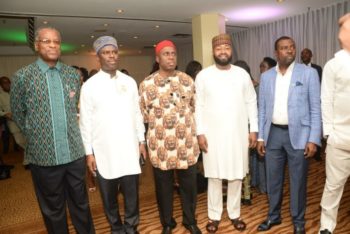
Nigeria on Friday lost its bid for election into Category C of the Council of the International Maritime Organisation (IMO) in London.
The election bid, spearheaded by Transportation Minister Rotimi Amaechi and his protege, Director-General of the Nigerian Maritime Administration and Safety Agency (NIMASA), Dakuku Peterside, reportedly cost Nigeria more than N300 million.
A source in NIMASA, who spoke on condition of anonymity, said the money was spent on travels and in hosting diplomats.
He described Nigeria’s delegation to the IMO London meeting as a jamboree.
“More than forty people were on the trip, which was led by the Transport Minister,” the source said.
A London-based Nigerian maritime analyst, Donald Adebola, who spoke with SHIPS & PORTS DAILY shortly after the election, attributed Nigeria’s loss to “inexperience and shoddy preparation” by the handlers of the country’s bid.
He said, “It is clear that both the Minister and Peterside are not knowledgeable about the workings of IMO and while that is not wrong in itself, their inability to mobilise knowledgeable people on board to drive the process is confounding.”
The last time Nigeria won its IMO Council bid was in 2007 under Dr. Ade Dosunmu who was then the Director-General of NIMASA. Every attempt made since then to return to the Council failed.
Forty countries were elected into the IMO Council in three categories for the 2017/2018 biennial.
The successful countries are China, Greece, Italy, Japan, Norway, Panama, Republic of Korea, Russian Federation, United Kingdom and United States in Category A.
Australia, Brazil, Canada, France, Germany, India, Netherlands, Spain, Sweden and United Arab Emirates were elected in Category B while Bahamas, Belgium, Chile, Cyprus, Denmark, Egypt, Indonesia, Jamaica, Kenya, Liberia, Malaysia, Malta, Mexico, Morocco, Peru, Philippines, Singapore, South Africa, Thailand and Turkey were elected in Category C.
Category A council members are countries with the largest interest in providing international shipping services, while Category B are countries with the largest interest in international seaborne trade:
Category C, which has 20 countries are those with pecial interests in maritime transport or navigation” and whose election to the Council will ensure the representation of all major geographic areas of the world,” according to IMO.
The Council, which is elected by the IMO Assembly for two-year terms beginning after each regular session of the Assembly, is the executive organ of IMO and is responsible, under the Assembly, for supervising the work of the Organization.
Between sessions of the Assembly, which is every two years, the Council performs all the functions of the Assembly, except the function of making recommendations to Governments on maritime safety and pollution prevention.
Nigeria’s became a member of IMO on March 15, 196. Although the country was expelled from the Organisation during the military regime of the late Gen. Sanni Abacha, especially after the killing of environmentalist Ken Saro-Wiwa and the Ogoni Nine, it was readmitted in 2000 when the then Minister of Transport, Chief Ojo Madueke, led a Nigerian delegation to win an election into the Council, in Category C. The country could however not retain the seat in subsequent election, but regained it nine years ago in the same Category. It has however lost re-election since 2009.